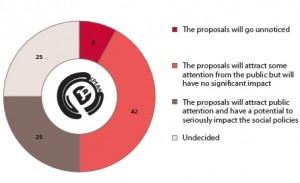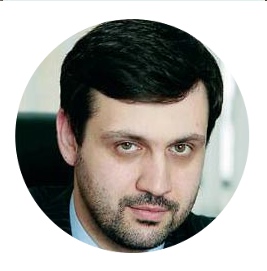The demographic problem
05/30/2011Results of an opinion poll among sociology experts (20 participants), held by SREDA Service in the spring of 2011
The experts appreciated the relevance of the“proposals to improve the policy on family care and childhood” of Patriarch Cyril, however they believe that these proposals will not be able to significantly influence state policies.
Respondents were asked to answer the following questions:
• Do you know about the “proposals to improve the national policy on family care, maternity and childhood” put forward by His Holiness Patriarch Cyril?
• Based on the given text of the proposals, please select the most popular and most controversial initiatives.
• In your opinion, how much demand is there for these “proposals”? Please rate them on a scale of 0 to 10: “0” – absolutely no demand, “10” – very much in demand.
• In your opinion, what could be the real practical consequences of these “proposals”?
• If you think that the “proposals” are quite in demand today but that there would be no real significant practical consequences thereof – what do you associate this with?
• In general, how do you evaluate the “proposals”? Please give your comments.
The vast majority of the experts are aware of the initiatives proposed by the Patriarch. In general, the experts responded positively to the “proposals.” 36% of respondents believe all of the proposed initiatives to be in demand.
Among the experts, the most popular suggestions were the following:
- establishment of housing projects for large families
- establishment of shelters for single mothers
- increase of benefits for large families to the level of average wages in their area of residence.
Some initiatives, however, did receive unequivocal responses. For example, 64% found controversial the proposal for a withdrawal of abortion operations from the CMI (compulsory medical insurance) system. Among the debated initiatives were the following:
- creation of crisis pregnancy centres at each maternity hospital, with psychologists and representatives of traditional religions;
- exclusion of abortion from taxpayer funded services.
In general, experts praised the “proposals” of Patriarch Cyril (the average score: “8.3” on a scale from 0 to 10 (where “0” was absolutely no demand, and “10” was very much in demand).
However, only a quarter of the experts believed that the “proposals” would not only attract public interest, but also would be able to influence national policies. Almost half of the respondents believed that the “proposals” may attract some public interest, yet will not be able to make any actual real impact, with some respondents believing that the “proposals” will go completely unnoticed.
Among the reasons why the “proposals” to improve the policy on family care and childhood put forward by Patriarch Cyril may not have a significant impact on the national policy of Russia, the following were voiced:
- The absolute unpreparedness of the society
- Mothers with many children would receive the national average salary, yet teachers with 30 kids in one class – only 4,000 roubles?
- Unpreparedness of the ROC to go through with defending their principles
- Particular opinions of the professional medical corporation which differ from those of the ROC
- The impression is that these proposals hide the real intentions: namely the need for priorities, established on the legislative level, regarding work in childcare institutions.
- Because the state, and even more so the employer, are not interested in spending money on people … Because people will continue putting up with it
- Implementation of these proposals is associated with financial costs
- Our state handles its tasks without taking into account the views of other public institutions
- The significance of the church in social and political life
- This is PR
- The Proposals are accurate and timely, because in Russia all the problems posed by the Patriarch affect large groups of people and are experienced very acutely. However, they may very well remain without real implementation. The church stands by these proposals, in style and in fact, as another state agency, telling what should be done…



